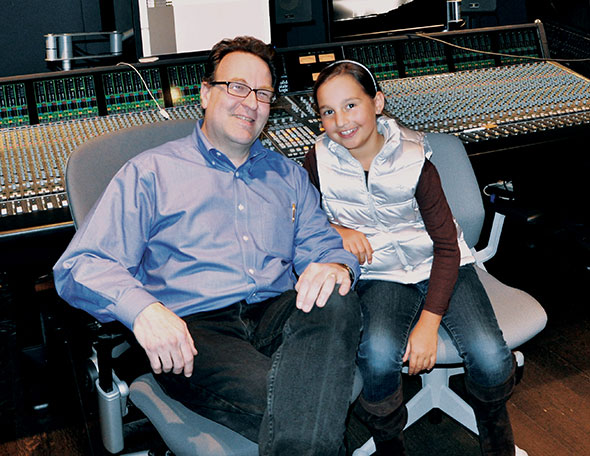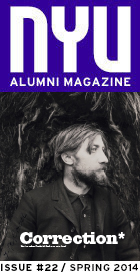music composition
Filmmakers Shoot, She Scores
A piano prodigy adds the silver screen to her repertoire
by Dulcy Israel
At some point in almost every professor’s tenure, he or she encounters a wildly gifted student who is also unusually young. Few, however, teach university-level concepts to a fourth grader—as Ronald Sadoff (STEINHARDT ’86) found himself doing three years ago with Emily Bear.
“I got a cold call from her mother,” remembers Sadoff, chair of the department of music and performing arts professions at the Steinhardt School of Culture, Education, and Human Development. “Emily was interested in a film-scoring workshop we do every summer in tandem with ASCAP [American Society of Composers, Authors, and Publishers]. I assumed she was a minor because her mother was calling, but I don’t think I realized she was 9 at the time.”
While they spoke, a quick search on the Internet revealed that Emily had won an array of awards, was a favorite guest of The Ellen DeGeneres Show, had performed at the White House and Carnegie Hall, and had composed pieces for full orchestras. Her musical range was astonishing. “The first thing that struck me was, Wow, this kid’s in more than one area,” Sadoff says. “It’s not just the classical piano. And she’s not simply a songwriter. And she doesn’t simply improvise.”
He recommended waiting on the workshop but asked Emily to come see him the next time she was in New York from Rockford, Illinois.
At their first meeting, he was bowled over, not only by the sheer talent of the friendly girl with long brown hair but also by how utterly unaffected she seemed, in spite of her immense gift.
“They clicked right away,” Emily’s mother, Andrea, observes. “A relationship was born.”
These days, in addition to studying with Mary Sauer, the Chicago Symphony Orchestra’s principal keyboardist; Veda Kaplinsky, head of the piano department at Juilliard; jazz keyboardist Alan Swain; and jazz/pop legend Quincy Jones—who produced Emily’s latest album, Diversity, for Concord Records last year—Emily flies in approximately every six weeks to compose with Sadoff. During a typical session, she’ll improvise scoring on a keyboard to a clip they’ve selected from NYU’s vast library of student and commercial films.
“He shows me all this new information and technology I wouldn’t have thought of,” Emily, now 12, gushes. “It’s awesome.”
Helping Emily find her “signature, creative voice” while “attaining full technical control of the compositional craft” is unlike anything Sadoff has done before, despite his 25 years as an NYU faculty member or the 30 documentaries and short narrative films he’s scored, including John Canemaker’s Oscar-winning 2005 animated short, The Moon and the Son: An Imagined Conversation. But this uncharted course is less a function of Emily’s tender years than her unbridled imagination. “She differs from most students because I have to immediately determine which of her often many ideas best suits the film or scene at hand, which should she develop to fruition,” he says. “The speed at which we’re working is swift and compelling.”
As is her schedule. This spring, Emily will headline numerous concerts—some solo, some with an orchestra, some with her jazz trio. She’s planning a summer tour and a new album and hopes to take a summer songwriting course at NYU—if time permits. Last June, she finally took the NYU film-scoring workshop that originally led her to Sadoff.
“I think the piece she wrote, as far as the structure and everything else, was put together in an hour and a half,” Sadoff says. “And the workshop faculty considered it to be one of the top-five scores. This is Sean Callery, who scored 24 and now Homeland, and Mark Snow, who wrote the X-Files theme. They don’t pull punches.”





